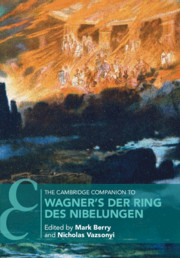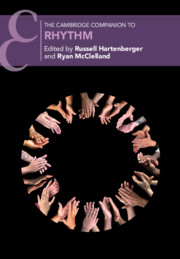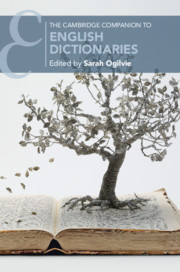22095 results in Cambridge Companions
5 - Listening for Leitmotifs: Concept, Theory, Practice
- from Part II - Aesthetics
-
-
- Book:
- The Cambridge Companion to Wagner's Der Ring des Nibelungen
- Published online:
- 18 September 2020
- Print publication:
- 24 September 2020, pp 124-140
-
- Chapter
- Export citation
Part I - Overview of Rhythm
-
- Book:
- The Cambridge Companion to Rhythm
- Published online:
- 18 September 2020
- Print publication:
- 24 September 2020, pp 5-38
-
- Chapter
- Export citation
Chapter 27 - The Scottish Dictionary Tradition
- from Part III - Dictionaries of English and Related Varieties
-
-
- Book:
- The Cambridge Companion to English Dictionaries
- Published online:
- 18 September 2020
- Print publication:
- 24 September 2020, pp 315-323
-
- Chapter
- Export citation
Part II - Performing Rhythm
-
- Book:
- The Cambridge Companion to Rhythm
- Published online:
- 18 September 2020
- Print publication:
- 24 September 2020, pp 39-94
-
- Chapter
- Export citation
2 - Perception of Rhythm
- from Part I - Overview of Rhythm
-
-
- Book:
- The Cambridge Companion to Rhythm
- Published online:
- 18 September 2020
- Print publication:
- 24 September 2020, pp 20-38
-
- Chapter
- Export citation
Chapter 2 - How a Word Gets into an English Dictionary
- from Part I - Issues in English Lexicography
-
-
- Book:
- The Cambridge Companion to English Dictionaries
- Published online:
- 18 September 2020
- Print publication:
- 24 September 2020, pp 7-17
-
- Chapter
- Export citation
12 - Placing the Ring in Literary History
- from Part IV - Impact
-
-
- Book:
- The Cambridge Companion to Wagner's Der Ring des Nibelungen
- Published online:
- 18 September 2020
- Print publication:
- 24 September 2020, pp 269-296
-
- Chapter
- Export citation
Part II - English Dictionaries Throughout the Centuries
-
- Book:
- The Cambridge Companion to English Dictionaries
- Published online:
- 18 September 2020
- Print publication:
- 24 September 2020, pp 87-252
-
- Chapter
- Export citation
Chapter 20 - Dictionaries of Canadian English
- from Part III - Dictionaries of English and Related Varieties
-
-
- Book:
- The Cambridge Companion to English Dictionaries
- Published online:
- 18 September 2020
- Print publication:
- 24 September 2020, pp 255-264
-
- Chapter
- Export citation
Part VI - Epilogue
-
- Book:
- The Cambridge Companion to Rhythm
- Published online:
- 18 September 2020
- Print publication:
- 24 September 2020, pp 313-330
-
- Chapter
- Export citation
Part I - Myth
-
- Book:
- The Cambridge Companion to Wagner's Der Ring des Nibelungen
- Published online:
- 18 September 2020
- Print publication:
- 24 September 2020, pp 57-82
-
- Chapter
- Export citation
Notes on Contributors
-
- Book:
- The Cambridge Companion to Rhythm
- Published online:
- 18 September 2020
- Print publication:
- 24 September 2020, pp xix-xxiv
-
- Chapter
- Export citation
Chapter 3 - Technology and English Dictionaries
- from Part I - Issues in English Lexicography
-
-
- Book:
- The Cambridge Companion to English Dictionaries
- Published online:
- 18 September 2020
- Print publication:
- 24 September 2020, pp 18-30
-
- Chapter
- Export citation

The Cambridge Companion to Nineteen Eighty-Four
-
- Published online:
- 18 September 2020
- Print publication:
- 01 October 2020

The Cambridge Companion to Wagner's Der Ring des Nibelungen
-
- Published online:
- 18 September 2020
- Print publication:
- 24 September 2020

The Cambridge Companion to Rhythm
-
- Published online:
- 18 September 2020
- Print publication:
- 24 September 2020

The Cambridge Companion to English Dictionaries
-
- Published online:
- 18 September 2020
- Print publication:
- 24 September 2020
1 - The Form of the Canterbury Tales
-
-
- Book:
- The Cambridge Companion to The Canterbury Tales
- Published online:
- 21 August 2020
- Print publication:
- 10 September 2020, pp 1-20
-
- Chapter
- Export citation
Further Reading
-
- Book:
- The Cambridge Companion to The Canterbury Tales
- Published online:
- 21 August 2020
- Print publication:
- 10 September 2020, pp 255-266
-
- Chapter
- Export citation
10 - The Franklin’s Symptomatic Sursanure
-
-
- Book:
- The Cambridge Companion to The Canterbury Tales
- Published online:
- 21 August 2020
- Print publication:
- 10 September 2020, pp 151-165
-
- Chapter
- Export citation

